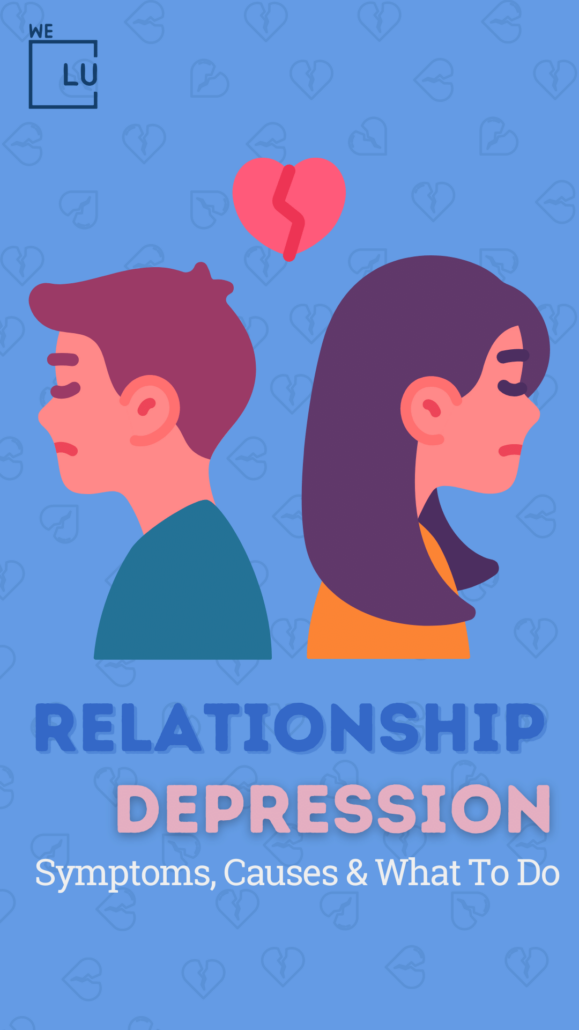What is Depression?
Depression, a prevalent worldwide mental health condition, is a distinct mood disorder. The word “depression” is often used informally to mean sadness. However, clinical depression is marked by long-lasting mental and physical symptoms such as:
- Sadness.
- Irritability.
- Low self-esteem.
- Fatigue.
- Trouble concentrating.
- Changes in appetite and sleep.
- Loss of interest in activities.
- Decreased libido.
- Suicidal thoughts.
For these signs to be considered depressive, they must last for a long time and most of the day, almost every day.
What is Relationship Depression?
People sometimes use the word “relationship depression” to refer to a specific type of depression that happens because of problems in a romantic relationship. It’s necessary to make it clear that “relationship depression” is not a separate medical disease. Instead, it’s a term for how depression can affect relationships.
There are many ways that depression can affect interactions. Some people start showing signs of depression because of stress or problems in their relationships. Some people can be depressed even when they’re in a healthy, happy relationship. Depression is a complicated mental illness that is affected by many things, such as biology, genetics, surroundings, and psychology.
How Does Depression Affect Relationships?
In many ways, depression can have a significant impact on relationships:
- Communication Problems: Depression can make it hard to talk to people because it can make you withdraw, speak less, and have trouble expressing your thoughts.
- Emotional Distance: Depression makes people emotionally distant, which makes it hard for both people to be involved in the relationship and causes stress for everyone.
- Loss of Interest: When someone is depressed, they lose interest in doing things with you, which makes the connection less enjoyable and satisfying.
- Tension and conflict: Depression can make a person more irritable and cause their mood to change, which can cause more fights and stress in their relationship.
- Intimacy Problems: Depression can make you less interested in being sexually intimate and less physically close, which can make you feel frustrated and rejected.
- Support and caretaker Role: Being there for a depressed partner can be hard on your emotions, which could lead to caretaker burnout.
- Isolation from others: Depression can make people withdraw from society, which can make both partners feel alone and make relationship problems worse.
Having severe depression can make it hard to make long-term decisions like marriage, family planning, or financial choices because the person’s mental health isn’t always apparent.
How Can Relationships Affect Depression?
Relationships can affect mental health, and sometimes, they can cause “relationship depression.” Several things in a relationship can lead to this situation, including
- Infidelity: Finding out that your partner has been cheating on you can make you feel ashamed, betrayed, and emotionally harmed. Cheating on your partner has been linked to a higher chance of depression and even suicidal thoughts.
- Abuse: Especially in women, intimate partner violence, such as mental abuse, can cause new cases of major depressive disorder. Men may be more likely to develop worry after being abused.
- Long-Distance Relationships: Many people find happiness in long-distance relationships, but the difficulties of being apart and worrying about the future of the relationship can make relationship-related stress worse.
- Breakup of a Relationship: The end of a serious relationship can cause significant changes in your life, like anger, loneliness, grief, and sometimes being away from your kids or pets because you have to move.
What are the Signs Of Depression In Relationships?
You feel overpowered.
When you feel weaker and less capable than the person you’re communicating with, depression may develop. However, not all power disparities result in depression. For instance, even though a parent holds most of the power in a positive parent-child connection, everything will work out if the parent uses that authority to nurture. In a similar vein, employers are more powerful than workers. However, shared power is healthy in adult love relationships.
You experience judgment.
A put-down is when someone says, “You shouldn’t have bought that new sweater.” Critique is an issue, not constructive criticism. Feedback usually begins with an “I” statement, such as “I felt uncomfortable when I saw your new sweater because I’m worried about whether we’re going to have enough money to handle our expenses this month.” Feedback lets you know politely that something you have been doing is incorrect. Contrarily, criticism becomes troublesome when delivered critically and with an urgent tone of voice.
Your partner directs your actions.
Bossy behaviors are discouraging. Even a mild request, such as “Go grab the paper for me, honey,” will likely make the recipient angry or depressed. Nobody enjoys being given instructions. Better is to inquire. Requests accept the responses yes or no.
Your partner tries to control You.
Depression is likely to ensue if you make decisions about how to spend your time, money, friends, or family. Keep in mind that depression can cause a power disorder. Depression may soon follow when your partner takes away your ability to make independent decisions (or at least to participate in joint choices).

Skip To:
Learn More:
- Rehab for Depression & Anxiety Treatment
- Is Depression Genetic or Environmental?
- Does Vitamin D Help With Depression? What You Need To Know
- 30 Songs About Depression To Help You Feel Less Alone
- Is Depression a Disability? Eligibility, Applying
- 20 Depression Memes That Will Make You Feel Less Alone
- Relationship Depression, Symptoms, Causes and What To Do
- Depression Art: The Link Between Depression And Creativity
- Dementia and Depression Connection, Top Signs & Symptoms
- Short-Term Disability Mental Health





